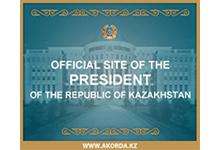Tue, 09/14/2021 - 15:33
Chairman of the Supreme Court, Zhakip Asanov, met with Maria Ribeiro, OSCE Representative on Freedom of the Media.
Before the meeting, the activities of the Communication Center were presented to the distinguished guest. So, Elena Maksyuta and Nazgul Rakhmetullina, the judges of the Supreme Court, and Yeldos Zhumaksanov, Deputy Head of the Department of the Supreme Court, talked about the active work on raising legal awareness carried out by the judges in the media and social networks, the prompt response to appeals in social networks and the organization of briefings on high-profile cases by judges, and about the training of judges on how to properly conduct clarifications and on public skills.
Nail Akhmetzakirov, Head of the Supreme Court Department, spoke about the work of the Situation Center. He showed how the system constantly monitors judicial administration issues across more than 750 indicators in all courts of the republic in real-time. The speaker noted that “It makes possible to transfer almost 95% of all cases online, resolve promptly emerging issues, improve the quality of proceedings, introduce the elements of artificial intelligence into proceedings and programs on the preparation of judicial acts”.
M. Ribeiro called the information work significant and thanked everyone for its implementation; she did not hide that she was impressed by the digitalization scale of the judicial system, highlighting the resources spent on such implementation.
Nazgul Yergaliyeva, an independent expert on human rights, named 7 main painful areas for the courts in the presentation of the collection “Courts of Kazakhstan: realities, trends, prospects”: independence from the executive power and senior managers of courts, lack of professionalism, corruption, accusatory bias, priority to government agencies, low-quality judicial acts and the level of service. For each area, N. Yergaliyeva listed the measures taken to eliminate them and the results of what was done. As she stated, the number of acquittals has doubled: from 397 in 2015-2017 to 861 in 2018-2020. For instance, the number of acquitted for grave and especially grave crimes increased from 12 in 2015 to 210 in 2019 and 105 in 2020.
The transformation effects have allowed Kazakhstan to improve its performance in global ratings significantly. In the Global Competitiveness Index – Judicial Independence, Kazakhstan improved its position from 79 to 71 between 2017 and 2019. Also, the positions enhanced for 2017-2020: in the Rule of law index “Civil Justice” from 50 to 40 and from 70 to 58 in “Criminal Justice”, and from 9 to 4 in Doing business “Enforcing Contracts”.
N. Yergaliyeva outlined 5 main measures taken to ensure the adversarial criminal process, the digitalization of justice, the uniformity of judicial practice, the efficiency of the civil proceedings and the fight against corruption. In conclusion, the speaker highlighted the vitality of applying the institute of mediation.
The meeting in the Project Office was continued by A. Tukiev, the judge of the Supreme Court, who talked about the principles of administrative justice, the introduced new form of proceedings, its legal basis and infrastructure of courts.
Zh. Asanov, welcoming the meeting participants, emphasized the effective cooperation with the Office of the Organization for Security and Cooperation in Europe in Nur-Sultan, established over many years.
In turn, M. Ribeiro voiced her gratitude for the exciting presentations, focusing on the importance of implementation in law enforcement.
The meeting participants expressed a mutual commitment to the development of further cooperation.
Related materials
- A Memorandum of understanding was signed between the Department of the Supreme Court and the Organization for Security and Co-operation in Europe Programme Office in Nur-Sultan
- The judges-coordinators got acquainted with the trends of media communications
- Supreme Court judges explained to representatives of foreign companies the principles of administrative justice







